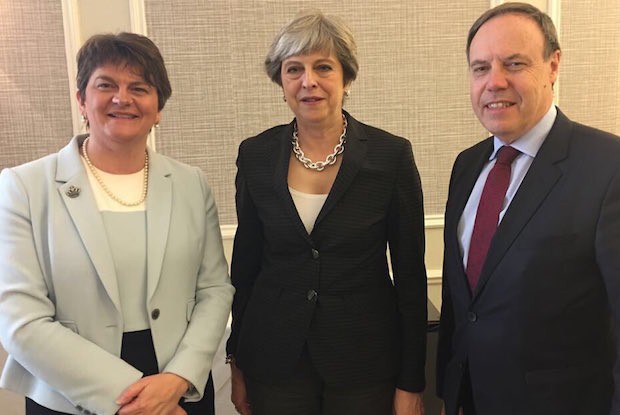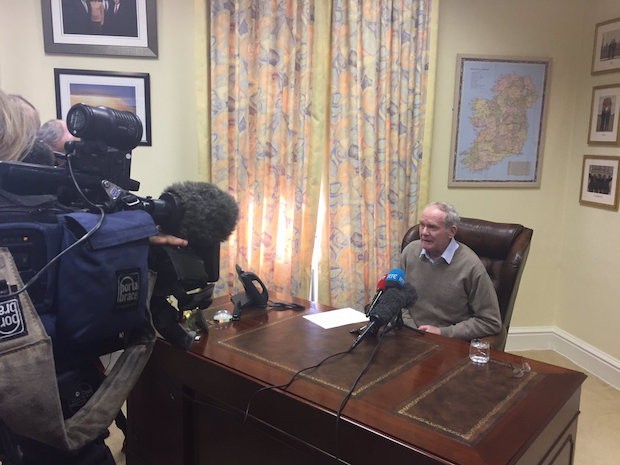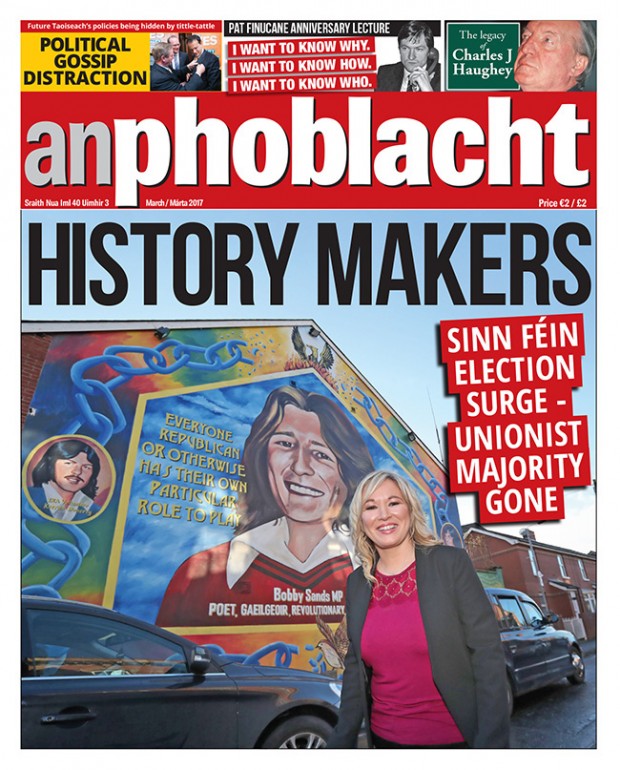29 November 2017
DUP/Tory power pact now has primacy over power sharing

● DUP leader Arlene Foster and DUP MP Nigel Dodds with British Prime Minister Theresa May at the Conservative Party conference in October
The DUP has opposed the implementation of previous agreements and particularly the rights agenda
THIS TIME LAST YEAR, the full extent of the RHI scandal was beginning to fully reveal itself. Within six weeks, Martin McGuinness had resigned as deputy First Minister.
RHI was the decisive tipping point which caused the current political crisis. It was the latest financial scandal associated with the DUP to overshadow the political institutions.
One year on, it has become the subject of a public inquiry established by Máirtín Ó Muilleoir.

● Martin McGuinness resigns
The NAMA Loan Book scandal is an ongoing criminal investigation and the basis of a new book by Frank Connolly.
The Red Sky controversy also remains fresh in the popular mind.
In any other democratic society, RHI would have been enough to crash an administration. However, a much broader context applies.
The DUP had lost the run of themselves within the institutions.
Those most hostile to sharing power with Sinn Féin had begun to intensify their pushback against power-sharing government and the Good Friday Agreement since Peter Robinson broke the Maze/Long Kesh Agreement in 2013.
Martin McGuinness’s resignation letter of January 2017 remains the benchmark for understanding how the political institutions became so politically corrupted and unsustainable due to the denial of basic rights and past agreements.
This ‘appalling vista’ could have been avoided had the DUP embraced the spirit and principles of the Good Friday Agreement and worked the political institutions in good faith.
But that was only ever going to happen if the current British Government had resolved to fully meet its obligations as a co-guarantor for the Good Friday Agreement since it was elected in 2010.
The acid tests for citizens’ rights and equality in the North, and whether this state can deliver equality and parity of esteem, have become the Irish language, marriage equality, Bill of Rights, funding for legacy inquests and dealing with the past.
These are all British Government obligations.
We have said repeatedly that the denial of these rights would not be acceptable elsewhere on these islands. They represent the fundamental framework for a rights-based society.
Since March of this year, Sinn Féin has been seeking agreement on these issues and the implementation of outstanding agreements.
Throughout this period, the DUP has opposed the implementation of previous agreements and particularly the rights agenda.
Four phases of talks have already occurred this year. All these have been unsuccessful.
The latest of these ended on 13 November after 12 weeks of engagement with the DUP and the two governments.
However, the DUP has remained totally intransigent. DUP resistance to equality and previous agreements has been reinforced by the Tory/DUP pact.
The results of the Westminster general election formalised an anti-equality/pro-austerity/pro-Brexit axis between the Tories and the DUP.
As a result, the position of each has become dependent upon the other.
The loss of the unionist political and electoral majority in the Six Counties means the DUP now looks towards Westminster to shore up its political position and the electoral survival of the Tory Government relies upon its pact with the DUP.

The DUP’s opposition to a rights-based society in the North was emboldened since their pact was agreed with the Tories. It was decisive in the failure of the last round of talks on 13 November.
Sinn Féin was no longer prepared to engage in a process of meetings which were intended not to produce a conclusion.
Both the British Government and the DUP may have been calculating that understandable public fatigue with the protracted lack of political progress would in itself force Sinn Féin to acquiesce and agree to go back to the ways things were without the required substantive change.
If that is indeed the case, both have seriously miscalculated the fundamental nature of the political crisis and the determination of Sinn Féin not to return to the status quo.
A Rubicon has been crossed in the North.
Last week in Downing Street, Sinn Féin told the British Prime Minister that her government must bear the greater responsibility for the failure to reach agreement on the restoration of the institutions.
We told her that direct rule is not an option.
In the meantime, the political crisis has deepened. It is being exacerbated by the British decision to include a statute of limitations for British forces and agents in the Stormont House Bill consultation, as well as the Tory and DUP Brexit agenda.

Sinn Féin has said to both the British and Irish governments that they must now look to the provisions of the Good Friday Agreement and establish the Inter Governmental Conference involving both governments to map a way forward, implement agreements and honour citizens’ rights in the absence of sustainable political institutions.
The failure to reach agreement on what is needed to re-establish the institutions on a sustainable, democratic basis will not airbrush away the issues at the crux of the crisis. Make no mistake: these will have to be addressed either in the mid or longer term. We will be coming back to the same point.
The DUP annual conference changed nothing. However, the party leader was correct to say respect is not a one-way street. Yet all that merely highlights is why the DUP does not agree to a rights-based government.
This week the British Secretary of State failed to produce any firm proposals to move the process forward.
When Sinn Féin reinforced the message that the onus rests upon the two governments to outline how they intend to implement previous agreements and end the DUP’s denial of rights, a party spokesperson suggested that Sinn Féin had “checked out” of the political process in the North.
That intervention cuts to the chase, because for as long as the DUP persists in looking for excuses not to make an agreement there will be no progress.
It’s time the DUP “checked in” to the reality that it will not be returning to government until a rights-based, power-sharing administration which is avowedly anti-sectarian is established.
Anything short of that threshold will not be sustainable and the political process will fail all citizens of the North again.
If the DUP and British Government intend to give primacy to their political pact over the greater good and partnership government in the North, then popular nationalism and other progressive civic and political opinion needs to politically organise and campaign for both the defence and the full implementation of the Good Friday Agreement.
Follow us on Facebook
An Phoblacht on Twitter
Uncomfortable Conversations

An initiative for dialogue
for reconciliation
— — — — — — —
Contributions from key figures in the churches, academia and wider civic society as well as senior republican figures





